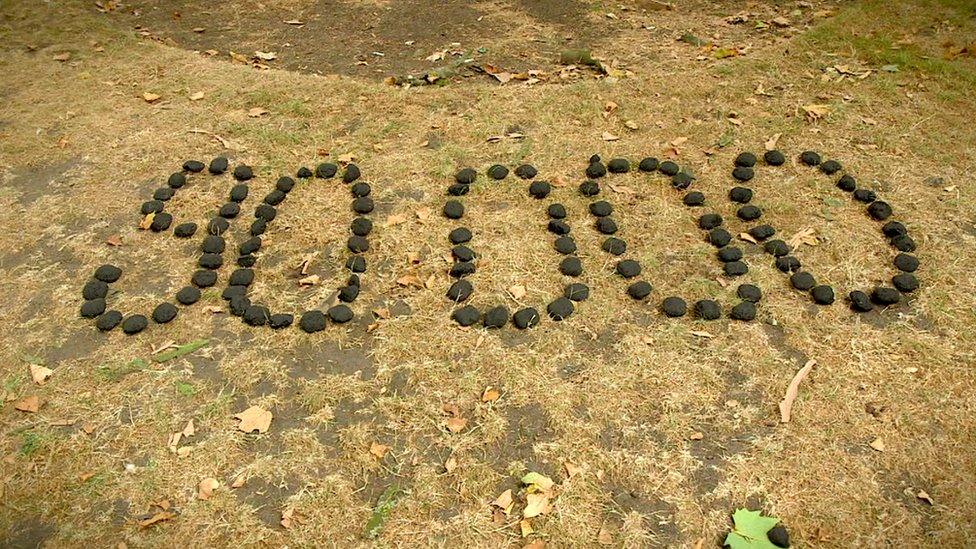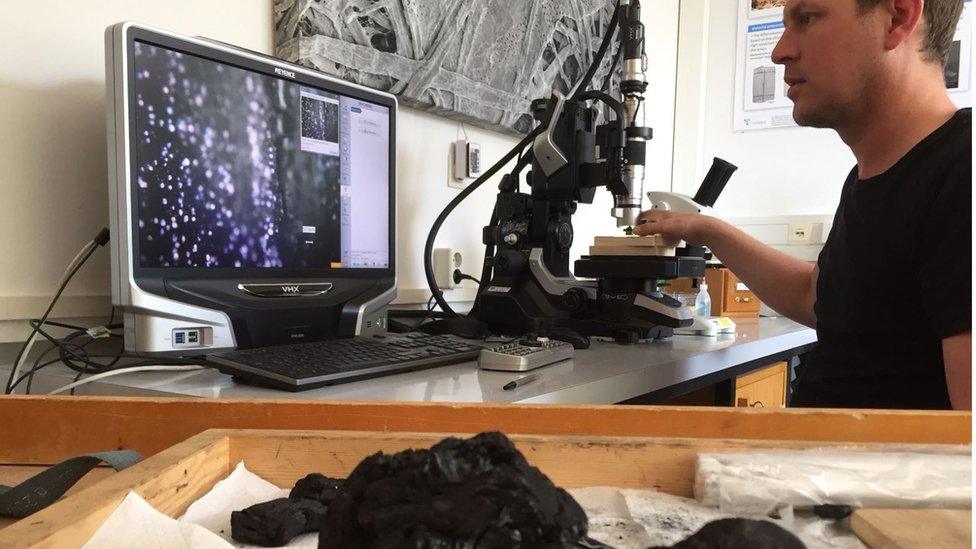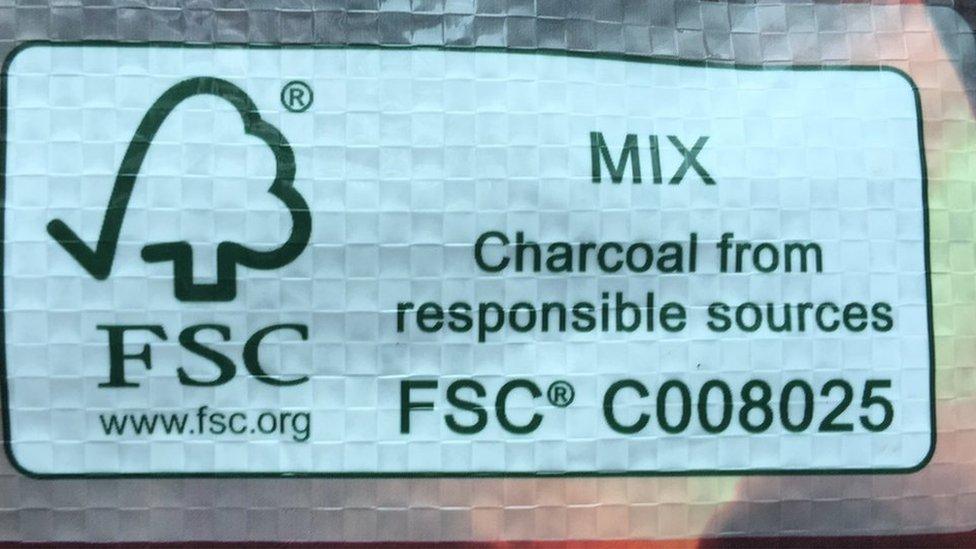Is UK barbecue charcoal fuelling global deforestation?
- Published

The UK is importing record amounts of charcoal
A growing taste for al fresco dining is driving record charcoal sales in the UK but is it also fuelling global deforestation and climate change?
Last year Britain imported nearly 90,000 tonnes of charcoal.
It's much cheaper than sourcing it from within the UK but where is it coming from and at what cost to the environment?
The BBC took a random selection of charcoal bags from supermarkets and shops to be tested.
The testing was carried out at a specialist laboratory by experts in Hamburg, Germany.
Volker Haag is a scientist at Thünen-Institut of Wood Research. He carried out the independent tests to ascertain exactly which species were in the bags.

Volker Haag says charcoal is much harder to identify than solid wood.
Mr Haag told us: "Within the investigation of the four assortments that you brought to us, we found mixture of timbers which naturally originate in tropical and sub-tropical areas.
"For example, we discovered Eucalypt which we find in Australia, also Fabaceae and Acacia, which could be from South America, from Asia or from Africa."
Forests in tropical and sub-tropical regions are home to many endangered species which need to be protected for the health of the embattled planet and the fight against climate change.

How the tests were carried out:
Every type of timber has its own anatomical structure which is what is needed for identification, sometimes known as the "anatomical finger print"
It is much harder to identify species in charcoal than in normal solid wood. If charcoal comes into contact with water or resin - the structure is destroyed
Because of this, slides cannot be prepared, so the surfaces are broken for micro analysis
A 3D reflected light microscope is then used to make a three-dimensional scan of the surface of the charcoal, which looks like a little mountain
The mountain images are put together to create a 2D image which can then be used for identification

Whilst it is not illegal to source charcoal from tropical forests, most retailers do claim their supply chains originate in sustainable woodlands.
The majority of the bags, though, have no information about the country of origin, let alone specific forests. But most do carry the FSC logo.
The Forest Stewardship Council is the world's biggest certification scheme of wood products.
Its stamp should be an assurance that the charcoal is sourced from well-managed forests but the head of the organisation Kim Carstensen, told us mistakes have been made.
"I am sure there has been tropical charcoal coming into the UK market. I am sure most of these would have been without the FSC logo but I cannot guarantee that there hasn't been any problem with some of the FSC certified materials.
Volker Haag from the Thünen-Institut for Wood Research carried out the tests
"Since last year, we have been looking into the charcoal business as a high risk area. We have found charcoal where we were uncertain about where it came from. We thought 'hmmm, this looks different from what we had expected'."
Mr Carstensen said that the charcoal business is considered "high risk".
The supply chains are complex and, as a result, in the last year, the FSC has retracted certificates from 21 companies which were found to be selling unsustainable products.
The FSC has more than 200 million hectares of forests, across the globe as what it calls certified forests but not all of them are mapped.
According to UN figures, the UK imported nearly 90,000 tonnes of charcoal last year, up from around 70,000 tonnes in 2016.
The charcoal came from different places, including Nigeria and Paraguay where deforestation is a major issue.
Last year, the two countries supplied 10,000 tonnes of charcoal each to the UK.
Conservationists in Nigeria, which has one of the highest deforestation rates in the world, are quite worried.

The FSC certifies sustainable wood
"Deforestation in the country is alarming and disheartening for some of us who work in the conservation sector," says Stephen Aina, a conservation officer with the Nigerian Conservation Foundation.
"Due to the proximity to the Lagos port, forests in Oyo State and in areas sharing a boundary with Benin Republic have been largely destroyed.
"Kwara State is now one of the major hotspots of charcoal production in the country."
Greenpeace International recently disassociated itself from the FSC, asking the organisation "to act with urgency to improve the transparency".
The FSC's Kim Carstensen said mixing of the wood from different locations by suppliers was a major challenge in terms of providing information on the source.
He said "It's more complicated. Once it gets mixed, you cannot say it is from one place, it will be from several places … then what is the information you are going to get (from the label)?"
Studies have shown that the mixing up of charcoal by suppliers is a major threat to tropical forests.
Research by WWF Germany has found Poland imports charcoal from risk-prone countries, particularly from Ukraine and Nigeria - which are then repackaged before being sent to Germany.
Poland is also one of the main suppliers to the UK.
"In the whole of Europe I would say the risk is really high," says Johannes Zahnen of WWF, Germany.
"The (source) countries we are talking about like Paraguay and Nigeria and also Ukraine - all you can think of, it's corruption, illegal logging, destructive logging, forest destruction," he says.
"And it's definitely not sustainable what is happening there. And if you are buying from there, it's a high risk, that you are linked to these criminal things and to this really destructive thing."
The global deforestation picture
About half the wood extracted worldwide from forests is used to produce energy, mostly for cooking and heating, according to the Food and Agriculture Organization.
Of all the wood used as fuel worldwide, about 17 % is converted to charcoal.
The UN body expects global charcoal production to continue to increase in coming decades.
Suppliers and supermarkets
Marks and Spencer
• At M&S, we have a comprehensive sustainable wood policy.
• We work with the FSC
• We are aware where the product is sourced from, but it's commercially sensitive information and therefore not something we can share.
Big K (supplies Marks and Spencer and local petrol stations across the country)
• Big K places huge importance on the sourcing of all our charcoal products.
• Since 1999, we have been a certified supplier of FSC goods.
• In addition, we also conduct our own due diligence on the products we supply.
CO-OP
• Co-op packaging now states that the product is produced and packed in Namibia.
• Our product is made from Acacia which is an invasive bush species.
• All Co-op Fair Trade charcoal is from one of four agricultural farms in Namibia.
• The pack also carries the FSC mark
Tesco sells both "FSC certified" and non-certified brands.
• It has not as yet responded to our request.
Fuel express (supplies Tesco)
• It has not as yet responded to our request